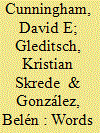|
|
|
Sort Order |
|
|
|
Items / Page
|
|
|
|
|
|
|
| Srl | Item |
| 1 |
ID:
156657


|
|
|
|
|
| Summary/Abstract |
Previous studies find a strong relationship between armed conflict and gender equality, but only compare armed conflict to no armed conflict onset. However, opposition movements use different means to challenge governments, such as nonviolent or armed strategies. This study explores this variation and poses the question: How does the level of gender equality affect the onset of nonviolent campaigns and armed conflicts? It makes two contributions. First, I quantitatively test the impact of gender equality on different forms of conflict onset, and second, I propose a comprehensive gendered mobilization argument based on strategic choice theory. Nonviolent campaigns rely on mass participation, and the nonviolent conflict literature claims that they are open to a wider array of participants, including women, compared to armed conflicts. I argue that gender norms affect movements’ expectations of mobilization (mass or limited) as well as conflict norms (nonviolent or violent) in society, and subsequently, the choice of conflict strategy. I hypothesize that higher levels of gender equality, measured by fertility rate and female-to-male primary school enrolment ratio, increase the likelihood of nonviolent campaign onset, compared to both armed and no campaign onset. This study analyses country-year data from the UCDP and NAVCO datasets between 1961 and 2006 and finds that increases in gender equality are, on average, associated with an increased likelihood of nonviolent conflict onset.
|
|
|
|
|
|
|
|
|
|
|
|
|
|
|
|
| 2 |
ID:
154843


|
|
|
|
|
| Summary/Abstract |
Dissidents can choose among different tactics to redress political grievances, yet violent and nonviolent mobilization tend to be studied in isolation. We examine why some countries see the emergence of organized dissident activity over governmental claims, and why in some cases these organizational claims result in civil wars or nonviolent campaigns, while others see no large-scale collective action. We develop a two-stage theoretical framework examining the organized articulation of political grievance and then large-scale violent and nonviolent collective action. We test implications of this framework using new data on governmental incompatibilities in a random sample of 101 states from 1960 to 2012. We show that factors such as demography, economic development, and civil society have differential effects on these different stages and outcomes of mobilization. We demonstrate that the common finding that anocracies are more prone to civil war primarily stems from such regimes being more prone to see maximalist political demands that could lead to violent mobilization, depending on other factors conducive to creating focused military capacity. We find that non-democracy generally promotes nonviolent campaigns as anocracies and autocracies are both more likely to experience claims and more prone to nonviolent campaigns, conditional on claims.
|
|
|
|
|
|
|
|
|
|
|
|
|
|
|
|
|
|
|
|
|